Related Research Articles
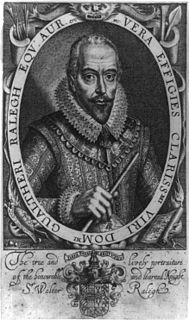
The Lord Warden of the Stannaries used to exercise judicial and military functions in Cornwall, in the United Kingdom, and is still the official who, upon the commission of the monarch or Duke of Cornwall for the time being, has the function of calling a stannary parliament of tinners. The last such parliament sat in 1753.

Adolph I of Cleves was the second Count of Cleves and the fourth Count of Mark.
Bowden is a historic estate in the parish of Yealmpton in Devon, England. From the 15th century until 1748 the manor house was for eight generations the seat of a junior branch of the Copleston family of Copplestone. The manor house was largely rebuilt in the 19th century and, together with some of its outbuildings, now serves as a farmhouse.
Sir John Juyn, SL, was an English judge who served as Chief Justice of the King's Bench (1439–40).
John Arundell or John Arundel may refer to:

Sir Philip Courtenay of Powderham, Devon, was the senior member of a junior branch of the powerful Courtenay family, Earls of Devon.

Sir Philip Courtenay, of Powderham, Devon was the fifth son of Hugh Courtenay, 10th Earl of Devon (1303–1377). He was the founder of the cadet dynasty known as "Courtenay of Powderham", seated at the manor of Powderham, until then a former Bohun manor of little importance, whilst the line descended from his elder brother, the Earls of Devon of the mediaeval era, continued to be seated at Tiverton Castle and Okehampton.
John Wilcotes, of Great Tew, Oxfordshire, was an English politician.
Ralph Mackerell was an English landowner and Member of Parliament.
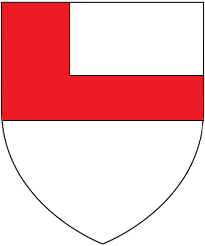
Richard Wydeville was an English landowner, soldier, diplomat, administrator and politician. His son married an aunt of King Henry VI and they were the parents of the wife of the next king, Edward IV.
Sir Richard Hankford was holder by right of his wife of the feudal barony of Bampton and part of the feudal barony of Barnstaple in Devon, England.
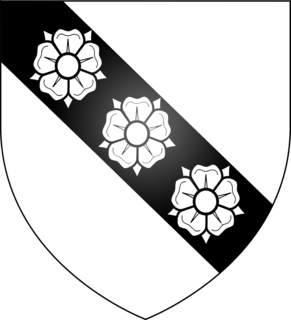
Sir Robert Cary of Cockington, Devon, was twelve times Member of Parliament for Devon, in 1407, 1410, 1411, May 1413, April 1414, Mar. 1416, 1417, 1419, May 1421, 1422, 1425 and 1426. Much of his later life was devoted to regaining the many estates and other landholdings forfeited to the crown following his father's attainder in 1388. He was an esquire in the households of King Richard II (1377–1399) and of the latter's half-brother John Holland, 1st Duke of Exeter.
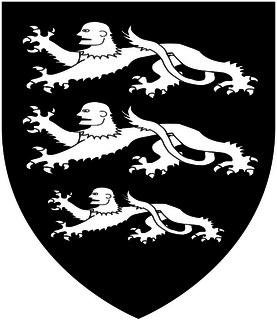
Nicholas Radford of Upcott in the parish of Cheriton Fitzpaine, and of Poughill, Devon, was a prominent lawyer in the Westcountry who served as Member of Parliament for Lyme Regis, Dorset and Devon (1435). During the anarchic times of the Wars of the Roses he was caught up in the dynastic Westcountry rivalry between Thomas de Courtenay, 5th Earl of Devon, of Tiverton Castle, for whom during his minority he had acted as steward, and William Bonville, 1st Baron Bonville, of Shute. His murder in 1455 by the Earl's faction "ranks among the most notorious crimes of the century", and was the precursor of the Battle of Clyst Heath (1455) fought shortly thereafter near Exeter by the private armies of the two magnates. He served as a Justice of the Peace for Devon (1424-1455), as Escheator for Devon and Cornwall (1435-6), Recorder of Exeter (1442-1455) and as Tax Collector for Devon in 1450 and as Apprentice-at-law for the Duchy of Lancaster (1439-1455).
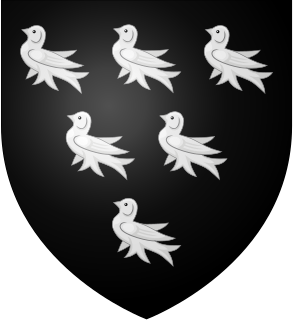
John Arundell, called The Magnificent, of Lanherne in the parish of St Mawgan in Pydar in Cornwall, was an English knight who inherited large estates in the County of Cornwall. He was Sheriff of Cornwall and was one of Henry IV of England’s Kings Knights. In his will dated 1433, he bequeathed money for the preservation of the head of St Piran in the chapel at Perranzabuloe.
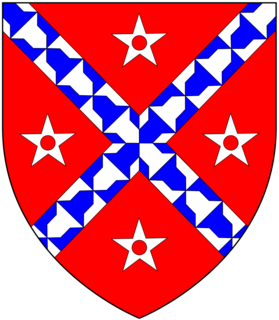
Robert Hill (c.1361–1423) of Spaxton, Somerset was four times MP for Somerset, in 1414 and 1415 jointly with Sir Hugh Luttrell (c.1364–1428) of Dunster Castle, and then in 1416 and 1419.
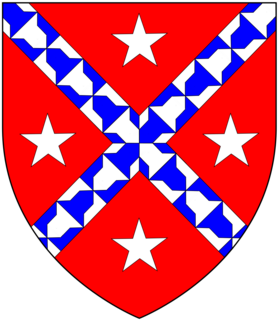
Sir John Hill of Kytton in the parish of Holcombe Rogus, and of Hill's Court in the parish of St Sidwell in the City of Exeter, both in Devon, was a Justice of the King's Bench from 1389 to 1408. He sat in Parliament for a number of Devon boroughs between 1360 and 1380.
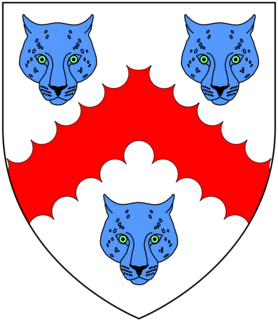
Thomas Coplestone (1688–1748) of Bowden, Yealmpton, Devon, was a British landowner and Whig politician who sat in the House of Commons for 29 years from 1719 to 1748.

Sir Robert Ogle (c.1370–1436) of Ogle, Northumberland was an English landowner, Member of Parliament and administrator.
Thomas Arundell was an English politician who was MP for Cornwall in 1417, 1419, 1429, and 1435 and High Sheriff of Cornwall 1422–1423, 1426–1427, 1432–1433 and Devon 1437–1438. He was the son of son of John Arundell (1366–1435), The Magnificent, of Lanherne, Cornwall. He was also a justice of the peace in the county.
References
- ↑ "COPPLESTONE, John (d.1458), of Copplestone in Colebrooke, Devon". History of Parliament Trust. Retrieved 31 July 2019.